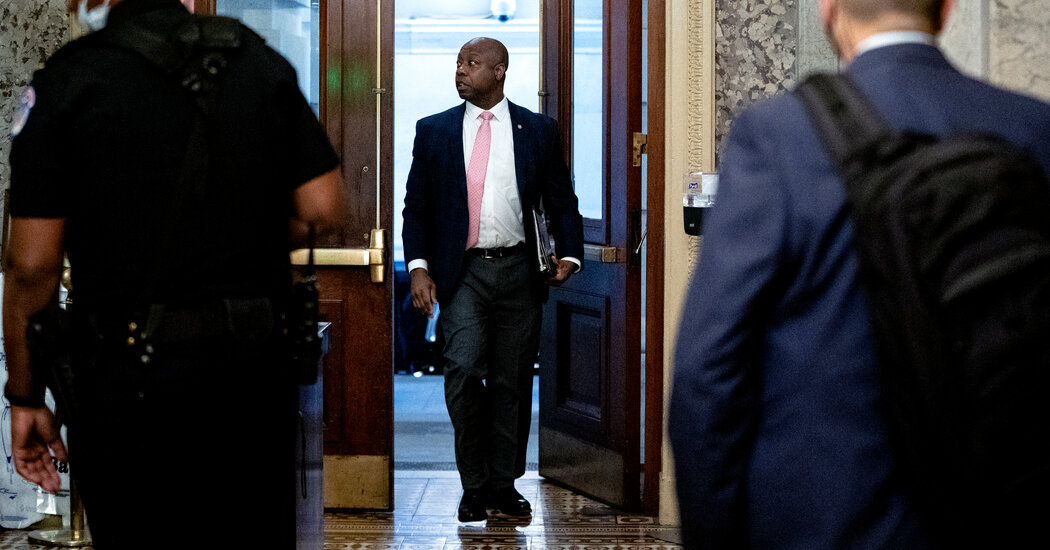Democratic senators pleaded on Wednesday for passage of far-reaching federal voting rights protections, painting state measures imposed by Republican legislatures curtailing access to the ballot box as a threat to democracy so dire that longstanding filibuster rules should be changed to ensure their enactment.
Republicans were equally passionate in their denunciations of the Democratic effort, accusing their opponents of concocting a false crisis to justify a federal takeover of local voting rules to warp the results for partisan gain.
The drama of the day was not likely to change the results of the votes planned for Wednesday night. At about 6:30 p.m., the Senate was set to vote to cut off debate on the legislation, which Democrats say is urgently needed to counter widespread balloting suppression efforts being enacted by Republicans at the state level. Though every senator who caucuses with the Democrats supports it, a Republican filibuster will block the voting rights measure from reaching a final vote.
Democratic leaders then plan to move to change the Senate’s filibuster rules without Republican consent. That, too, was on track to be blocked when Democratic Senators Joe Manchin III of West Virginia and Kyrsten Sinema of Arizona join all 50 Republicans in voting it down, denying their party the majority it would need to make the change.
Senators are spending the day debating the bill, which the House approved last week, and arguing over the very nature of their institution as they clash over the rights of the minority to thwart legislation, and whether the filibuster — a storied Senate tool for asserting them — needs to be weakened.
“Nothing less than the very future of our democracy is at stake, and we must act or risk losing what so many Americans have fought for — and died for — for nearly 250 years,” said Senator Gary Peters, Democrat of Michigan.
Though they brought up the legislation on Tuesday using a procedural shortcut that avoided an initial Republican blockade, Democrats were far short of the votes needed to win its passage over unified G.O.P. opposition and lacked the votes needed in their party to change Senate rules and enact it unilaterally.
Republicans were firm in their opposition, saying it was the Democratic Party that was seeking to influence election results for partisan gain. In Washington, Senator Bill Cassidy, Republican of Louisiana, said, “Every edge is sought, and every edge secured is exploited to keep your party in power.”
Still, Democratic leaders announced that they would mount a long-shot effort to establish an exception to the filibuster for voting rights bills, requiring opponents to hold the floor for an old-style “talking filibuster” that would allow a final, 51-senator majority vote — instead of the 60 currently needed — to move forward after all senators exhaust their opportunities to speak.
“If the Senate cannot protect the right to vote, which is the cornerstone of our democracy, then the Senate rules must be reformed,” Mr. Schumer said.
The Democrats’ plan, unveiled in a private party meeting on Tuesday night, would still require a partisan vote to change the rules, meaning it cannot succeed at this point given resistance from at least two Democrats.
No Republican currently supports the voting rights measure, which combines two far-reaching bills intended to protect access to the ballot box, leaving Democrats 10 votes short in the evenly divided Senate.
As debate got underway, many Democrats were seated at their mahogany desks on the floor, a show of force they planned to continue throughout the day for what they consider a historic debate. Republicans, by contrast, were mostly absent.
When they did appear, it was to rail against the legislation and Democrats’ portrayal of its opponents as bigots trying to enable voting restrictions aimed at people of color.
“I am not a racist,” said Senator John Thune of South Dakota, the No. 2 Senate Republican.
The impasse has led to intensifying calls to unilaterally change filibuster rules so Democrats can bulldoze over Republicans’ objections. But at least two Democrats, Senators Kyrsten Sinema of Arizona and Joe Manchin III of West Virginia, have made clear they will not do so, even though they support the legislation.
Republicans strongly pushed back on that effort. Senator Mitch McConnell of Kentucky, the minority leader, reiterated his threat that Republicans would use its power to virtually shut down the Senate should Democrats successfully execute what is known as the “nuclear option” and gut the filibuster.
“The Senate in nuclear winter would not be a hospitable place,” he warned.































